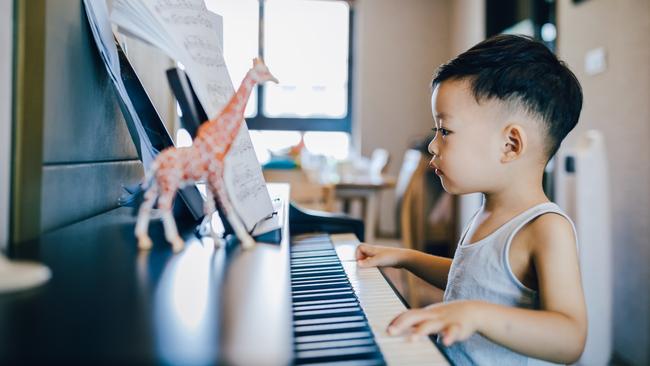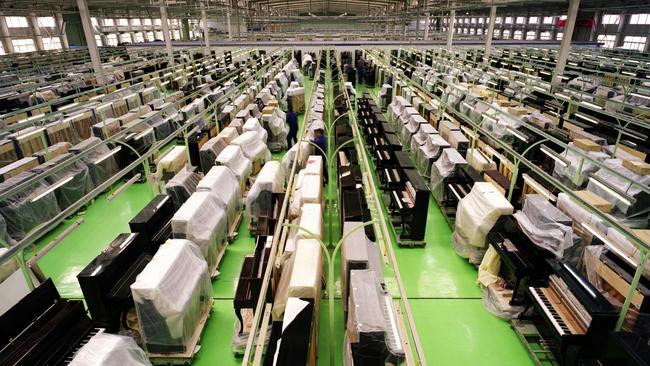How Chinese children won the battle of the piano practice
Millions of middle-class parents have admitted defeat over what was once seen as a symbol of social mobility, leading to cuts and job losses in a formerly booming industry

If you’re having difficulty selling your old piano or have been forced to give it away for nothing, you may want to blame the Chinese middle classes.
China’s size has given it the power to move stock exchanges on the other side of the world with shifts in state policy or popular fashion.
Now that has happened with the standard household upright as Chinese parents fall out of love with music lessons and flood the market with second-hand pianos.
When Grace Duan, now 11, took up the piano four years ago, the whole family swore she would stick at it. And she did, reaching grade 7 this year.
But that was a crossroads. Like so many mothers before her, Grace’s could not stand the battles over music practice any longer.
“To be honest she was never the most diligent at piano practice, nor the most naturally gifted performer,” Daisy Duan says.
“Now, with the secondary school entrance exams approaching, she wants to stay ahead academically. I have to say that before we took the decision, I was torn.
“Now we’ve done it, it’s just a huge relief. The last week has been pure bliss.”
If it were just the Duans, the loss of Grace to the world of piano would be a drop in the ocean of the tens of millions of Chinese families who have forced their offspring to learn in recent decades.
As with the British and Australian middle classes a century ago, the piano has been a symbol of social mobility.
But across Britain, possibly because of and certainly since the pandemic, children have been giving up lessons in droves.

And with China the biggest driver of the market for pianos, as in so many other areas of the global economy, the shift in taste has worldwide consequences.
Production and sales of pianos have slumped after years of an extraordinary boom. Companies providing pianos for rent are going bust. Workers in piano factories are being laid off.
And as the country’s import market has halved, from almost 200,000 in 2019 to 100,000 four years later, so the world is suffering a piano glut. Steinway, the world’s best-known “heritage” brand, has cancelled plans for a further listing of shares.
By 2019 China, the world’s greatest manufacturing nation, was also leading the way in meeting the world’s greatest demand for pianos.
At one stage, Steinway estimated, more than 30 million Chinese children were taking classes.
Piano manufacturing in China began in the 19th century when Western tastes began to permeate what had been a culturally closed society. But the industry really began to challenge the world after Deng Xiaoping launched his policy of “opening and reform” in the late 1970s.
Then parents began to be inspired by the emergence of superstar pianists such as Lang Lang, the prodigy from Shenyang who was playing to international concert halls by the age of 13.
Piano building took hold in the southern province of Guangdong, near Hong Kong, around the Pearl River Delta.

The Pearl River Piano Factory, now situated in a bland industrial park east of Guangzhou, soon became the world’s largest manufacturer. Pearl River built pianos for Western companies such as Ritmuller, which it eventually bought, low-cost versions for the domestic market, and then its own Western-sounding brand, Kayserburg.
By 2019, the Chinese were buying 400,000 pianos a year, more than 10 times the number sold in the US. More than a third of these were made by Pearl River Piano.
Now things look very different. “I would say our sales are down by 30 to 50 per cent,” an accountant at the firm says.
The company will not give figures in advance of forthcoming company results but sales of more than 156,000 in 2019 fell to 71,000 in 2023.
Two decades ago, visitors to China were often surprised to be quizzed on when they started their children on lessons. The assumption was that all self-respecting middle-class families indulged and the earlier the better.
But President Xi Jinping has proved to be sympathetic to the plight of children burdened by competitive parents with ever more work, particularly English lessons. In 2021 he banned some after-school classes.
Music classes were not among them but parents have taken the hint and allowed their children to do even more homework and it is unclear what the long-term effect will be.
Duan says if she had to start again, she probably would not give Grace piano classes.
“Now I see how competitive the outside world is,” she says. “Even if a child masters their current curriculum, there’s always more. Learning the piano may just have been a waste of time.”
THE TIMES






To join the conversation, please log in. Don't have an account? Register
Join the conversation, you are commenting as Logout